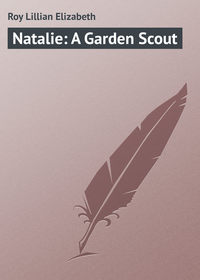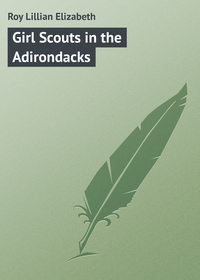 полная версия
полная версияThe Woodcraft Girls at Camp
"Humph! I could yearn for the millennium-time when the lion and lamb shall walk together, for then the grouse will be quite safe, won't he?" said Zan, almost in tears over the troubles of the little brown bird.
"Yes, that will be a wonderful time, Zan, and we shall all be at peace there," replied Miss Miller, looking away out of the open door.
"Now see what you started, Zan Baker!" whispered Elena, who was impatient to continue the bird stories.
Miss Miller laughed and Zan retorted, "A demerit for Elena – using slang!"
"I've chosen the hawk – not because it is beautiful or lovable but because I do not know much about them," said Zan.
"Well, you have covered three distinct types in one selection, for the owl, the eagle and the hawk have much the same habits. Now read your lesson," said the Guide.
"The hawk family has several branches, the most common and the fiercest is called the sparrow hawk. In olden times the nobles at Court liked to go hawking – that is they trained hawks to hunt for them. Too, falcons were used for the same purpose.
"A hawk has a beak much like a falcon, but its wings are shorter and lacks the pointed tip. It is found in cold countries and in the hills and mountains of northern climates.
"Among the hundreds of varieties in the world, there are over thirty distinct kinds in America. Among the commoner known are the pigeon hawk, the chicken hawk, the sparrow hawk, and marsh hawk."
Zan stopped short and studied the book for a moment, then said, "It doesn't say anything about nests or the young hawks."
"Well, then I will speak a good word for the hawk for he needs it. Farmers used to think he was an enemy to be watched and shot on sight. Recent years, however, have shown that the hawk will not steal a chicken or pigeon, if there are enough mice or rodents about. Even destructive insects will furnish a lunch for him, if he can find enough. As they destroy the very things a farmer dreads for his crops, they really become a ready-aid to house-cleaning the fields.
"From the reading Zan gave us you might be led to think that hawks only inhabited cold countries, but that is not so. They are well distributed over North America and migrate south with other feathered tribes. Some remain permanently in the south. The name sparrow hawk does not signify that he kills our little sparrow, for he does not. He lives mainly on insects. The hawk's nest is generally found in an old tree hollow and the eggs number four to five – brown spotted in colour and thick shelled.
"Mr. Thompson-Seton says of the marsh hawk, 'that they eat mice, reptiles, frogs, and birds, but rarely attack fowls,' and Mr. Seton is an authority not to be disputed.
"Well, we've had our five birds but the manual says we must have about ten. Miss Miller, it will be much nicer if you tell us about the others and let us hear and think, then apply our lessons later," suggested Zan.
The other girls heartily approved of the suggestion, so the Guide looked at her watch and smilingly said, "It is almost time for lunch, and we haven't been near the kitchen yet."
"Well, lunch can wait to-day – we have all afternoon anyway!" replied Jane looking out at the pouring rain.
"I think I'll speak of the birds we are apt to find in our woods at home. Then, should you see one you can better apply your knowledge," said the Guide.
"The swallow is one of our most graceful birds. There are the common barn swallow, the eave swallow, tree swallow and bank swallow.
"The barn swallow is our greatest neighbour; he is about seven inches long with a body of steel-blue on the upper parts, head, throat and breast a warm chestnut colour. The outer tail feathers are sharply forked in shape and are tipped with white. The wing feathers when spread wide also show a dot of white now and then. They travel as far north as Greenland in summer and go to South America in winter.
"The eave swallow builds its gourd-shaped nest under the eaves of the barn, as you doubtless understood from his name. The nests are built of clay or mud, and often, when the young birds are newly hatched the weight causes the nest to break away from the eaves and general destruction results. The brave little swallow begins anew, however, and soon another home and family are his reward. The nests are lined with soft feathers and grass and have a small round entrance from which the lady of the house peeps forth at her neighbours.
"Eave swallows resemble their cousins the barn swallows in shape and color, but they are not as graceful and lack the forked tail. They are slightly shorter too, and have a brown ring around the neck.
"Bank swallows are always flitting about in daytime and you can often see them resting on the telegraph wires. He should be called the engineer swallow, as he is a digger of tunnels. He cuts into a bank with his feet until he has tunnelled for a yard or so. In a small nook at the end he makes the nest.
"These swallows are but five inches long and feed on insects as do all swallows. They are found in North America and migrate as far south as Brazil in winter.
"A bird sometimes called chimney swallow is also known by the name of chimney swift. It nests in the chimneys now, but in days when few white folks lived in America it lived in hollow trees or caves."
The girls sat with eyes intent on the Guide as she paused and Jane said, "Fine, Miss Miller, but you still have four more stories."
"I ought to be allowed time to breathe and take a sip of water like any public speaker does," said Miss Miller, rising to go to the porch where stood a bucket of fresh water from the well.
"We'll have a drink too, it is more convivial when all join in," laughed Nita.
"Since it is Nature's special brew I heartily endorse your suggestion," replied Miss Miller, in thought reading again the contents of Doctor Baker's letter.
Comfortably grouped once more near the fire, the Guide continued.
"A bird we are sure to hear while in camp is the whippoorwill. When you first hear his cry you will feel startled, wondering who is about to be whipped. Then, as the cry is repeated over and over from the willows, or some other tree, you will remember my story.
"This bird flies in the night and rests in the daytime. They build no nests but lay two eggs on a stump, or on the ground. It is a reddish-brown in colour, mottled with grey-black and white.
"They eat great quantities of destructive insects and thus prove a help to mankind.
"Many superstitious folk used to believe that a whippoorwill boded ill to the family it serenaded, but this foolishness is fast disappearing as the understanding of bird-life and denizens of the forest becomes wide-spread. And, girls, camps and organisations like Woodcraft are actually bringing about the boon of knowledge to deluded and ignorant mortals."
"Long live Woodcraft!" came from Zan in a deep-toned boom.
The others laughed and Miss Miller assumed a more comfortable position before she continued.
"There are so many sweet little birds that I am sure we have seen this summer that I hardly know where to begin. I want to speak of the oriole, the bobolink, the friendly sparrow, the lark, and, in fact, I can't repeat more just now. But one bird I must acquaint you with is the wood-pecker.
"In the spring you will see the red-headed wood-pecker. They used to be very tame and trusting, but they have thinned out considerably of recent years. The head, neck and throat are bright crimson, their backs black, and under parts white. The wings and tails are bluish black, and the wings in flight are plainly barred with white.
"He builds a nest in a hollow tree and feeds upon nuts which he stores in hollow fence posts and trees, as well as on insects and slugs. A favourite delicacy is the fresh sap of a tree. So eager is he to get the latter that he will drill a hole in a perfectly healthy orchard tree and drink the fluid that forms in the little cups drilled by the marauder. In this way, a fine fruit-bearing tree will soon show signs of the ravages of the sap-sucker.
"Our cheeriest bird-friend, I think, is the robin, for he announces that spring is surely come to stay.
"I am not going into details about robin, for you know as much as I do about him, but he ought to be included in our ten, I think," said Miss Miller.
"Oh, yes, he was a favourite with the Indians, too," added Zan.
"A queer bird I want to tell you about is the loon. You will not find him about this section of the country, but some day when we camp farther north in the mountains, we will recognise him readily. He utters a cry so like the wail of a human being that it is hard to believe a mere bird can do it.
"The loon is an accomplished fisherman and can dive as well as any expert, in fact he is known as the great diver. He swims like a fish and rides waves as easily as a sea-gull. The great speed with which he swims under water permits him to catch all the fish he wants for food.
"The loon is a peculiarly formed bird, the legs being set so far back under the tail that he almost topples over when walking on land, but this very thing gives him the power to propel swiftly in water.
"He builds a nest of grass and rushes as near the water as possible and two large eggs are laid and carefully hatched by the female.
"The keen desire of sportsmen to capture the birds that evaded them so cleverly, finally drove the loons of the Middle Atlantic States to find shelter in the north and west where primeval forest still protected them."
The Guide got up from her chair as a signal that the story-telling was over for the day, and the girls stretched out on the rug wishing the hour was ten instead of twelve.
"If you had all you wanted of one good thing you would never realise all the good things in store for you," said Miss Miller.
"I suppose lunch is a good thing, but when you have to get it before eating it, it somehow loses its quality of goodness," replied Hilda, getting up on hands and knees before standing erect.
"See how funny Hilda looks with her two pig-tails down over her head!" shouted Zan, while Hilda's head was bent low.
"That gives me an inspiration I needed for this afternoon's entertainment. I have been puzzled about Hilda's share in it. Now, if you girls will hurry to help with dinner, we can the sooner enjoy the surprise I have planned," said Miss Miller.
No further urging was necessary, for each anticipated a treat when Miss Miller spoke as she did.
CHAPTER FIFTEEN
THE THUNDER BIRD SPEAKS
Immediately after dinner, the Band gathered again in the living-room and Miss Miller began showing the girls how to make different kinds of knots. This was something new and it proved very interesting although it took a long time before anything like a successful knot resulted from the many twists and snarls made in the rope.
Then, Miss Miller showed them how to make a threadlashing, and to splice a rope correctly. This also was unusual work and proved interesting.
"I want to have you each try for a degree of Frontier Scout and eight tests successfully taken along these lines will win the degree for you. I wanted to teach you how to solder a tin and temper a knife. You already know how to use an axe correctly, and knowing how to do the things shown you this afternoon will make seven altogether. I spoke to Bill the other day about showing you how to milk his cow, and he laughed but proved willing to teach," said Miss Miller.
"Oh, Miss Miller, save us that experience!" cried Jane.
"I'd be scared to pieces to go near that wild-looking animal, Miss Miller!" exclaimed Nita, fear shining from her eyes.
"Why, she wouldn't hurt you," laughed Zan.
"But just think! She may turn and butt me!" said Nita, shuddering at the idea.
"Ha, ha! She couldn't, Nita – her horns are worn off with age!" screamed Zan, the very suggestion of grey old Bossy butting making her double over.
"Well, I think I'd rather lose a degree or take some other test," insisted Nita, so the subject was dropped for the time being.
The next hour was given to making records in Tally Books, filling in claims and witnessing properly all the claims the girls were entitled to take, and then the question of how to win additional coups and grand coups started again. Whenever a pause occurred in camp routine and fun, that seemed to lack something to fill in, the subject of how to win coups was always the most interesting to discuss.
Zan had gone to the porch to bring in a bucket of drinking water and she now announced that the rain had ceased and she had seen enough blue sky to make an old maid's night-cap.
"I don't think it can last!" said the Guide.
"Oh, don't say it so dubiously, Miss Miller. Haven't we had enough of rain all week?" cried Jane.
"It is through now, however! The wind has veered!" exclaimed Hilda who had gone to the side-door and watched the weather-vane on the barn.
"The wind may change again within a moment's time," ventured the Guide.
"Oh, pshaw! We'd rather take a chance on the weather than stay cooped here any longer!" said Elena, backed by the sense of being shut up in a house, even though the day had been disagreeable.
"Well, are we going to start for the Bluff?" came from Zan.
"Yes, but we may as well take our left-over dinner with us. It won't be such fun to get that camp-fire burning in the soaked fire-place," replied Hilda.
As the suggestion was a good one, the girls each took a dish or pail and started on the trail to camp.
"It really is too bad we couldn't take the cheerful fire with us – but I left the wire shield in front of it, in case it blazes up again," remarked Nita.
"That was very thoughtful of you, dear. I quite forgot about the fire," admitted the Guide.
"We won't need it again, so it doesn't matter much," came from Jane.
"Supposing it begins to pour rain again before night – shall we run to the house for the night?" said Elena, who had been listening to Nita's conversation with the Guide.
"It won't rain any more, never fear!" called Zan.
Wickee was not fond of walking in wet leaves, or past bushes that showered water all over him as he passed, so he dropped to the rear of the line and walked carefully in the narrow pathway that had been well-worn during the past month.
At camp, everything looked dismal and uninviting. The rain had beaten through into the cupboard and all the groceries were sodden. It had trickled on top of the ice-chest and by following a groove in the lid, managed to force an entry inside. The consequence was that a pool of rain-water stood two inches deep about the ice, butter, pudding for supper, and other items that were floating about when the lid was raised.
"I hope to goodness, the cots are dry! And the crex mats in the tents!" complained Nita.
"Humph! Feel of the mats!" laughed Zan, jumping up and down in her tent to hear the water squash underneath the piece of matting.
"My bed's all dry!" shouted Jane joyously.
"So's mine!" came from Elena.
"I'm thankful to say that mine is dry, too!" said Miss Miller, prodding the mattress.
"I put the rubber blanket over mine, so I know it's dry as bones!" laughed Zan.
"That is what we all should have done, for the dampness will permeate even if the tents are water-proof," said the Guide, spreading the rubber over her cot.
The other girls followed Zan's idea and then came out to see what was to be done about supper.
Just as they sat down on some rustic stools that had been made by the Band during the past weeks, the sun shot forth a ray as if to say good-night. The birds refused to come out and greet it, however, and nature seemed too wet to rejoice at the tardy appearance of the sinking orb of day.
"Let's build a roaring fire of our dry wood and sit about it telling ghost stories!" suggested Jane, after supper.
So, it came to pass that at bedtime that night, five sought their cots in a shivery frame of mind, due to gruesome stories, at which each tried to outdo the other in relating.
It was quite dark and the wind, which had not shifted, was blowing weirdly through the forest, ever and anon sending a dripping leaf, or wet twig into the faces of the fearsome girls.
"I can't help thinking of that cheerful log we left burning in the fire-place at the house," called Jane.
"And what a delightful walk it would be through the woods and over the buckwheat field!" sneered Zan.
"So long, girls, I'm in bed!" came from Hilda's tent.
"Mark for you in the morning – slang!" quickly added Elena.
Miss Miller, although standing on a thoroughly soaked mat, listened to the girls with a smile. She had raised a faint remonstrance when the ghost stories had become nerve-quaking, but the girls laughed merrily and begged to continue.
Just as she was ready to jump into bed a crack of thunder sounded directly overhead and a vivid flash of lightning illuminated the woods.
Shrieks from the other tents did not tend to make matters more comfortable, for it was inevitable that a shower was about to get them.
"Close the flaps and see that your tents are all well secured!" called the Guide.
In a short time the wind tore along the clearing of the Bluff and tried to rip up anything that was not rooted in the soil. The rain came down in a deluge while thunder and lightning seemed to come simultaneously, until the girls hid their heads under the bed-covers.
The water finally managed to trickle through the seams of the canvas and soon little pools of water stood in the hollows formed by the sides of the forms under the covers. Miss Miller had wisely inspected the pegs and ropes that held her tent down taut, but the girls neglected the advice given them a short time before. They took for granted that all would be well with the tents.
Then, a lull in the storm gave the girls courage to call to each other, "It's over, thank goodness! We're still dry!"
But they spoke too soon. A few minutes afterward a flash and peal of thunder announced a second storm, still heavier than the first one. A regular hurricane blew up the slope from the roadway and at every gust the tents threatened to give up their hold and fly away with the cyclone. The girls hurriedly jumped from their beds and held on to the straining ropes.
"I know just how a ship-wrecked sailor feels when the shred of sail is about to be torn away in the squall!" shouted Zan, so as to be heard above the commotion the storm caused.
Although her canvas was safe, the Guide arose and hurriedly dressed in case she would be needed at either of the other tents.
She was just about to light a candle when a horrifying yell, as from one throat, came from Hilda's tent – or at least where the tent had been. A terrific gale of wind had forced a way under the canvas and lifted the tent clear off the ground and flung it against some trees. The girls were left exposed to the elements and no partiality was shown by the rain on account of meager clothing.
"Help! Girls, come and help us get the tent!" screamed Jane.
Miss Miller was about to open the flap of her tent when the wind blew out the lighted taper. She leaned over to place it on the stand when screams from Zan and the third tent announced some catastrophe. They had hurriedly opened the tent-flaps and the wind, taking advantage of the opportunity, blew in and at once filled the hollow canvas opening. In another second both tents were blown over and down against the ground.
All five girls flew to Miss Miller's remaining tent and clamoured for admittance – the water pouring down their backs and their feet wet from the soggy grass.
The Guide shouted for them to enter one at a time through the tiny crevice she made in the opening of the tent. They crowded inside and stood shivering and ready to weep at their predicament.
"What shall we do?" cried Nita, who had never been exposed to such rude behaviour of the wind or weather.
"We can run down to Sherwoods', but they won't have any beds! They only have one room upstairs, you know," said Zan.
"You horrid thing, you talk as if this was a picnic!" whimpered Hilda.
"It is. After it is over you'll all sit and laugh at the figures you're cutting now!" shouted Zan, grinning in a superior manner at her companions.
Suddenly Miss Miller clasped her hands. "Thank goodness, we carried the trunk of steamer rugs into my tent the other week when you needed more room in your tents! I've got them right here and you girls can drop those soaking gowns and wrap the blankets about you for warmth and comfort."
The four extra thick blankets were taken from the trunk and one from the Guide's bed, giving each girl one. Zan had held a match during the time Miss Miller had to open the trunk, but it had burned down and gone out again. In the thick darkness the girls took off their gowns and wrapped the dry blankets about their forms.
The storm ceased as suddenly as it arose, so the Band debated the possibility of reaching the farm house that night.
"I left that lovely fire!" said Nita, with a sigh.
"And it can't be more than nine o'clock!" added Hilda.
"I say, let's start! We can't be more uncomfortable than huddled here. And we certainly can't sleep in one cot!" suggested Zan.
"Wait until I see if I can find the candle I had when the deluge came," said Miss Miller, groping about for the table.
"We'll need more than one light, Miss Miller," said Zan.
"I'll see if I can find the small stump I had last night," replied the Guide, finding the matches and lighting one.
The candle was soon lit and the stump found, so all prepared to leave the shelter of the small tent and seek the house.
Zan carried the new candle while Miss Miller fastened a hat-pin in the bottom of the stump and carried that. The girls easily avoided bushes and long wet grass in crossing over the Bluff, although their moccasins soon squeaked with water.
"I wish I knew where the lantern was – it would be so much steadier a light," ventured Zan, from the rear.
"I left it at the house the other day – I forgot to bring it back to camp," admitted Elena.
"I wish we had made a law to make folks pay forfeits for forgetting!" snapped Zan, impatiently.
"What's the matter with you to make you so cross? You're well rolled up in that blanket and you've got the torch, too!" retorted Elena.
Zan bit her lip but said nothing. The truth of the matter was that she felt guilty in driving Miss Miller out in the night with a rubber blanket wrapped about her. Zan reasoned that all the trouble would have been avoided if they had all paid attention to Miss Miller's advice in the beginning and pitched their tents in good ground between the trees as she did. Her tent stood any gale, while theirs – well, compare them!
"Oh, gracious me! There goes my blanket!" cried Nita, as the article slipped from her back and fell in the grass.
Just as Zan stooped to hold the candle so Nita could see where to take hold of the blanket, a puff of wind snuffed it completely out.
"Pshaw! Did you ever see the likes!" growled Zan.
"Here, light it at mine!" called Miss Miller.
Plodding along the narrow trail, now on one side in the wet grass, now on the other where the bushes shook drops all over them, they finally came to the maple grove.
"Thank goodness, we are thus far!" sighed the Guide.
"And the worst bit to cross or I'll miss my guess!" retorted Zan.
"Oh, no, we'll soon be through and over the wall of the buckwheat field. There, we can skirt the edge of the wall until we come to your lawn," added Jane.
"If you're not mired before you get to the field," said Zan, warningly.
"Why, what do you mean?" cried several voices.
"The Sap bush generally oozes water after a heavy, rain like to-day's. If we feel water bubbling up about our feet we'd better come back here and go around the grove," said Zan.
"We've had days of dry weather and the rain will have soaked in the ground immediately, so I guess we are safe to cross," replied Miss Miller, wearily.
Zan said nothing more but waited anxiously.
They managed to get over the snake fence safely and part way through the grove when a strong wind blew the branches of the maples enough to shake down a quantity of water from the leaves. As troubles never come singly, the water fell upon both small flames and extinguished them, leaving the Band in total darkness.









